WASHINGTON—North Korea’s drastic currency redenomination targets members of the country’s growing merchant class, many of whom have made their money through black market activities, according to analysts.
North Korea issued new currency Monday, dropping two zeroes off the won, according to South Korean news reports. The North Korean central bank put strict limits on the amount of old money that can be exchanged for the new won.
At the old rate, U.S. $1 was equal to 135 North Korean won.
The new currency issue has not been officially announced by the state-run Korean Central News Agency.
The move sent shockwaves through North Korea, with reports of citizens rushing to black market money changers to exchange their won for more stable U.S. dollars and Chinese yuan.
North Korean citizens were threatened with "merciless punishment" for defiance of the new currency rules and told they have until Sunday to exchange a maximum of 100,000 won (U.S. $690 at the official rate, but less than U.S. $40 according to black market rates) per person of the old currency for new bills.
But NGOs in Seoul now report that in response to widespread anger, those limits were raised to 150,000 won in cash and 500,000 won in bank notes.
‘Not market-friendly’
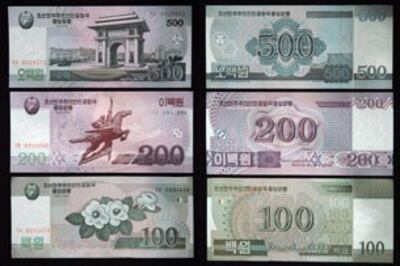
Abraham Kim, Asia analyst and research manager at the New York-basedEurasia Group, said the redenomination was no surprise because Pyongyanghas been trying to gradually reverse market reforms since the 1990s.
“You have a new merchant class that’s emerging. Markets have beenflourishing, but corruption has been rampant and the government has hada difficult time controlling the activities of these marketplaces,” Kimsaid from his office in Washington.
“So this recent revision … it’s a way to root out a lot of theaccumulated wealth that has been occurring in the last couple years,”he said.
“[It’s] a sure way for the central government to ensure that allthose who did profit from these illicit black market activities and whoare looking elsewhere than the state for their livelihood pay the costfor it.”
Scott Snyder, director of the Center for U.S.-Korea Policy at the Asia Foundation in Washington, said he expects the redenomination will have an “impoverishing effect” on people engaged in market activities and a negative impact on any economic activity either won-denominated or outside of the government’s control.
“This is the type of move a government takes when it is facing difficulty for whatever reason in terms of values of currency and its relationship to goods,” Snyder said.
“It’s obviously not a market-friendly move. It will raise transaction costs and make life more difficult for most people,” he said.
Curbing inflation?
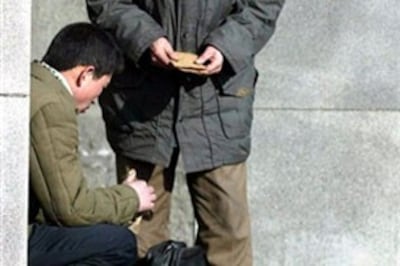
Jennifer Lee, research analyst at the Peterson Institute for International Economics in Washington, described the general purpose of the redenomination as a quick-fix solution to inflation and an attempt by the government to increase circulation by “bring[ing] out money that was stashed in the closets.”
But she added that given North Korea's “unique situation” and strict limits to the amount each household can exchange of old currency notes for new ones, “I mainly perceive it to be a part of the government's grand strategy to curtail the entrepreneurial market activities beyond state control.”
“This revaluation mainly hits the people engaged in market activities, and with the recent developments in the government's effort to crack down the markets to make people rely more on the state, the incidents seem aligned in its purpose,” Lee said.
Andrei Lankov, a Seoul-based North Korea expert who works as a commentator for RFA, said the major goal of the currency reform is to curb inflation by wiping out 'unofficial' cash deposits.
But he added that the redenomination has an additional goal of a political and psychological nature.
“It roughly restores the scale of prices and wages which existed in the late 1980s. Now, the average monthly wage will be about 40-50 won. Back in 1985 it was 70-80 won. A kilo of rice will cost some 25 won, and in 1985 the black market price was about 20 won,” Lankov said.
“This serves well the government’s proclaimed intent to 'normalize' the situation by essentially reviving the Kim Il Sung era system,” he said.
Impact on social strata
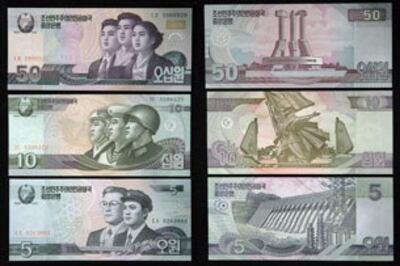
Snyder said that while the political elite will be shielded from the effect of the measure, other North Koreans who have accumulated cash in anticipation of a food shortage exacerbated by the winter season “will find that they would have been better served holding commodities.”
Kim agreed that the holdings of the political elite will remain unaffected by the currency change.
“For the common person who has become a merchant, the impact is probably going to be fairly strong because there are certain limits on how much you can exchange to the new currency,” Kim said.
"For the elite though, it is probably less so. Most of their wealth is likely based in foreign currency," he said.
But Kim added that not all of North Korea's elite will remain untouched by the revaluation and will likely attempt to slow its implementation in areas outside of the immediate influence of Pyongyang.
“Even in the more regional areas, the local party leaders and local political figures also benefit from these markets too because they take a cut from the products that come in, especially across from China. So when products come in, everyone benefits illicitly,” Kim said.
“Even though the orders come from Pyongyang that ‘we need to clamp down on these things,’ these regional folks will pay lip service to that, but it’s very difficult for them to actually implement it because they are benefitting from this,” he said.
Seeking a stable currency

Lee said the redenomination will affect different classes in different ways, depending on how much wealth they hold in their local currency.
“The elites and the merchants who deal with China will have less to worry about since they mostly hold their wealth in foreign currencies,” she said.
Instead, Lee said, North Korea’s middle and lower classes, which rely on market activities, will bear the brunt of the negative impact.
“First, they are the people who will most likely have extra cash that goes over the limit [allowed to exchange] hidden in their closets,” Lee said.
“Second, this indirect crackdown on market activities will make it harder for these people who were marginalized and couldn't get enough food from the government's Public Distribution System in the first place. They will suffer immensely with the food situation being dire and winter approaching,” she said.
But Lankov pointed out that few people in North Korea “have been stupid enough to keep their money in the local currency.”
“Because of both inflation and ever-present fear of another currency reform—the reforms happen once every 15-20 years—they keep their savings in U.S. dollars, Japanese yen and, above all, good old Chinese yuan,” Lankov said.
“People who will really suffer are retail traders who have to keep a large part of their capital in North Korean currency. This is especially applicable to sellers of grain, vegetables, and small daily necessities. Some small businesses might lose virtually everything,” he said.
Barter economy
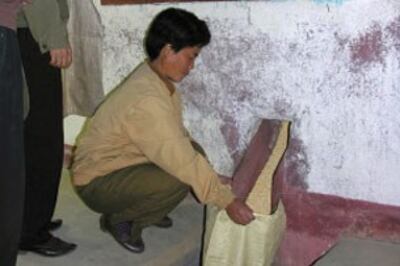
Analysts said that despite government efforts to curb unregulated market activities, a loss in faith of the stability of the won may cause North Koreans to turn in increasing numbers to bartering to supplement a shortage of food staples provided by the regime.
Snyder said an increase in the proportion of market activity conducted through bartering would diminish the impact of the redenomination.
“Regardless of whether there is a currency, there is still going to be an exchange. So people are going to take what they have or what they can produce and they’re going to try to exchange it for goods that they need,” Snyder said.
“For producers, the medium of exchange is probably going to be shifted,” he said.
Kim said that while bartering would be a natural response to such a drastic currency shift, most North Koreans lack anything of real value to barter with one another.
“The question is bartering for what? You have to have something to barter for. Bartering is possible when you have a flourishing economy with people who actually have things that are worth trading for, but here you have people that don’t have anything,” he said.
Possible unrest
Analysts agreed that political unrest in response to the currency redenomination is unlikely, despite the hardships North Koreans may endure.
Lankov said the negative effects of the redenomination would not last long.
“In regard to the food situation, any disruption is bad, but I would not expect anything really dramatic. Many rice sellers will be out of business, at least temporarily, but in a couple of months at most, everything will go back to the norm,” he said.
Kim said that the currency reform could lead to “sporadic spikes in instability,” but agreed that North Koreans are unlikely to initiate large-scale protests.
“There is nothing to mobilize them—there is nothing to lead the masses,” Kim said.
“Kim Jong Il has done an amazing job in trying to keep his elites loyal to him and repressing those who have been opposed to him, so I don’t see this leading to mass political instability,” he said, referring to North Korea’s current leader.
More defections?
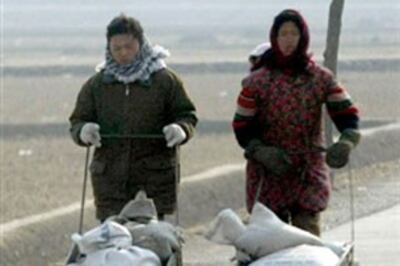
Kim added that unregulated marketplaces have traditionally functioned as “buffers that filled the gaps where the government ration system has failed.”
But he said that if North Koreans can no longer supplement their needs with products from these outlets, this could lead to increased defections out of desperation.
“People on the lower end who have been dependent on these markets—where are they going to get the stuff? And now people are faced with a decision again: starve or go find something in China,” Kim said.
“There is concern—and more in terms of the humanitarian area rather than riots and things like that,” he said.
Snyder said that rather than resulting in a national protest, “what you’re going to have is a set of individually incredibly tragic stories that are likely to be associated with this measure.”
“I think that is probably more likely than any kind of outrage and collective action and response, just because this [measure] is so clearly centrally driven,” he said.
Kim said the North Korean regime is wasting valuable resources printing up new currency when those funds might have been used for other more productive purposes.
“But for a country [whose] primary objective is control and ensuring the viability of the regime, it’s not surprising,” he said.
“This is, yet again, another further erosion of the society where people are increasingly becoming less fond of the regime.”
Original reporting by Joshua Lipes. Edited by Dan Southerland.
